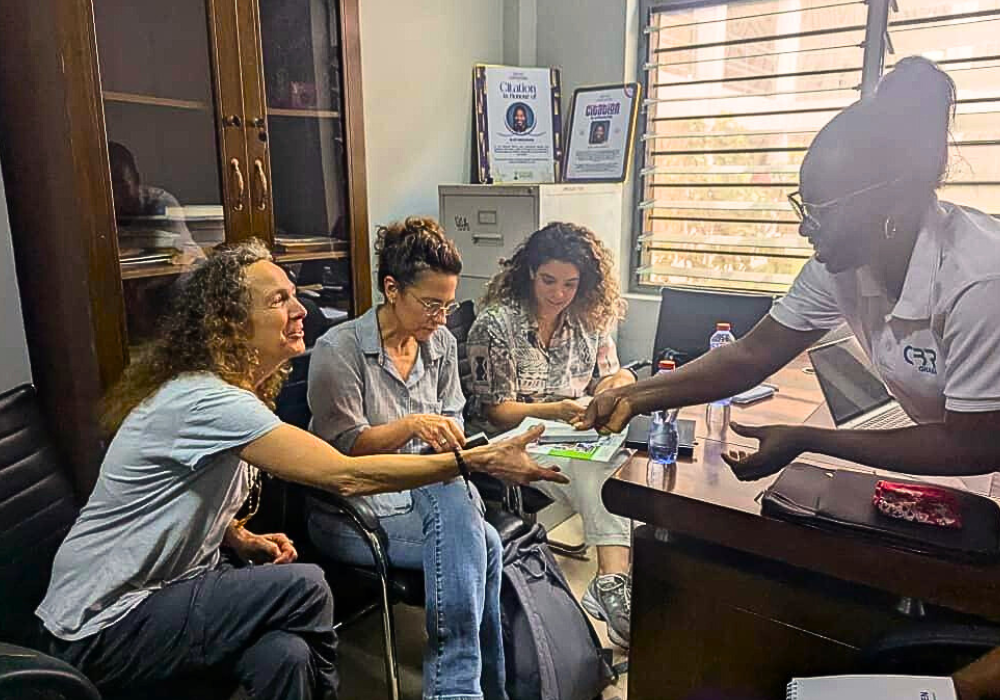Opinion: The Complexities of Ethical Communications are Worth the Effort

In 2017, singer Ed Sheeran became another example of a celebrity whose campaign to raise funds for children in Africa sparked a backlash. A Comic Relief video that featured Sheeran vowing to help children orphaned by an Ebola outbreak in Liberia raised accusations of “poverty porn” and “white saviorism.” Campaigns such as this one, critics said, focus too much on the celebrity, lack nuance, reinforce stereotypes, and often stigmatize the very people they are trying to help.
As a communications professional for more than two decades who is relatively new to the field of global development, I was torn when I learned of this controversy: The campaign was a clear success, raising over $100 million. But as the communications manager for OLAM, a network of Jewish and Israeli organizations that work in low- and middle-income countries, I’ve come to realize that the impact of our work extends far beyond the money we raise.
The continually evolving field of global development ethics compels those who work in it to consider all the implications of our actions. For communications professionals, these include the words and images we use, the stories we tell, and the way we tell them: Does our language perpetuate harmful narratives? Do those featured truly understand how their words and images will be used? Can sharing a story put an individual at risk?
These questions are particularly relevant in today’s world, where information is often shared at lightning speed and with a global audience. An image that perpetuates a sense that all children in Africa are affected by poverty and only foreign dollars will “save” them can have far-reaching consequences: Not only can it add to a simplistic and uninformed perception of Africa, a diverse continent of 54 countries, but the subject of the photo may have social media and see it. So, while Sheeran and Comic Relief no doubt had only good intentions, we must demand better.
It’s complicated
In all honesty, ethical communications practices are a continuous work-in-progress that is not straightforward — even for organizations constantly thinking about these issues. Despite our best efforts, we don’t get everything right, due to understaffing, underfunding, information gaps, and a host of other reasons. And sometimes because there is genuine disagreement among global development professionals themselves, and the public in general, over whether particular communications choices are ethical.
It’s essential to acknowledge that whatever decisions we make have trade-offs. There is a delicate balance between the need to respond urgently to a crisis and ensuring that we carefully consider the potential ramifications of our messages. To address these types of tensions, the Aspire Ethical Practices program aims to deepen ethical practices in our field. Among other tools the program offers are a “Ten Commandments” of ethical practices on various topics.
I must acknowledge that coordinating the steering committee that authored the “communications Ten Commandments” was a humbling experience. Committee discussions that took place forced me to examine my own biases. I quickly realized that ethical considerations go beyond merely adhering to a set of guidelines; they demand ongoing self-reflection, learning, and listening to others’ perspectives.
I found myself rethinking the language choices we make at my organization, and since Aspire launched, we hold annual meetings to review those choices. An assessment of our website’s photos resulted in us removing pictures when we couldn’t confirm that the subjects had consented to being featured on our website. But there’s still plenty of room for improvement: After revising our photo consent forms for a study trip to Rwanda to comply with our ethical communications policy for example, I received feedback from some who signed that the forms were too long and didn’t take their time into consideration.
A time to reflect
To all communications professionals, I say: We will make mistakes as we seek the right balance between the needs of all stakeholders. What we’ve shared through our own Aspire program is, of course, only a drop in the ocean. Therefore, our team keeps up-to-date with publications coming out of organizations such as InterAction and U.K.-based Bond. We monitor initiatives such as Radi-Aid, Everyday Africa, and the satirical Barbie Savior Instagram account — which have found creative ways to highlight these issues for a broader audience.
The quickly approaching Rosh Hashana, the Jewish new year, is a time of introspection for Jewish people. Each year, I pledge to take specific actions in one of the many areas where I can do better. This year, I’m focusing on improving OLAM’s communications practices and working with our partners who want to do better as well.
While this type of self-reflection is often filled with complexities and dilemmas, it is also filled with opportunities for growth. So, as I embark on my journey, I invite others to take on their own journeys: Let us reflect on our own biases, acknowledge and share mistakes, engage in constructive dialogue, and listen. Because only by navigating these challenges together and learning from each other will we collectively improve in our pursuit to make the world a more just place.
This opinion piece was originally published in Devex and has been reprinted with permission. See the original article.




